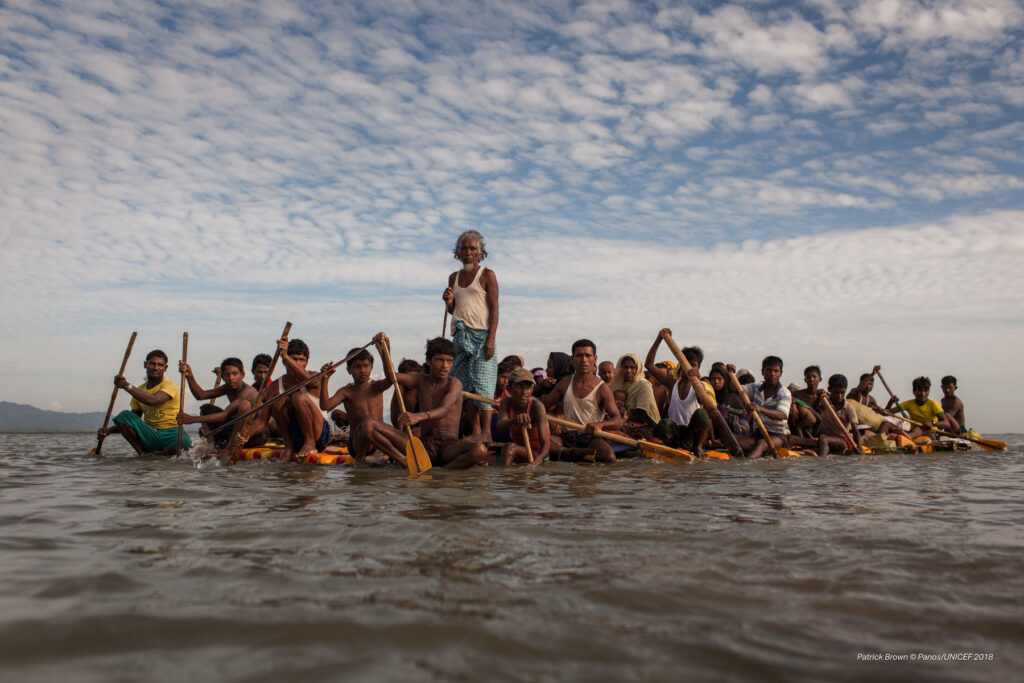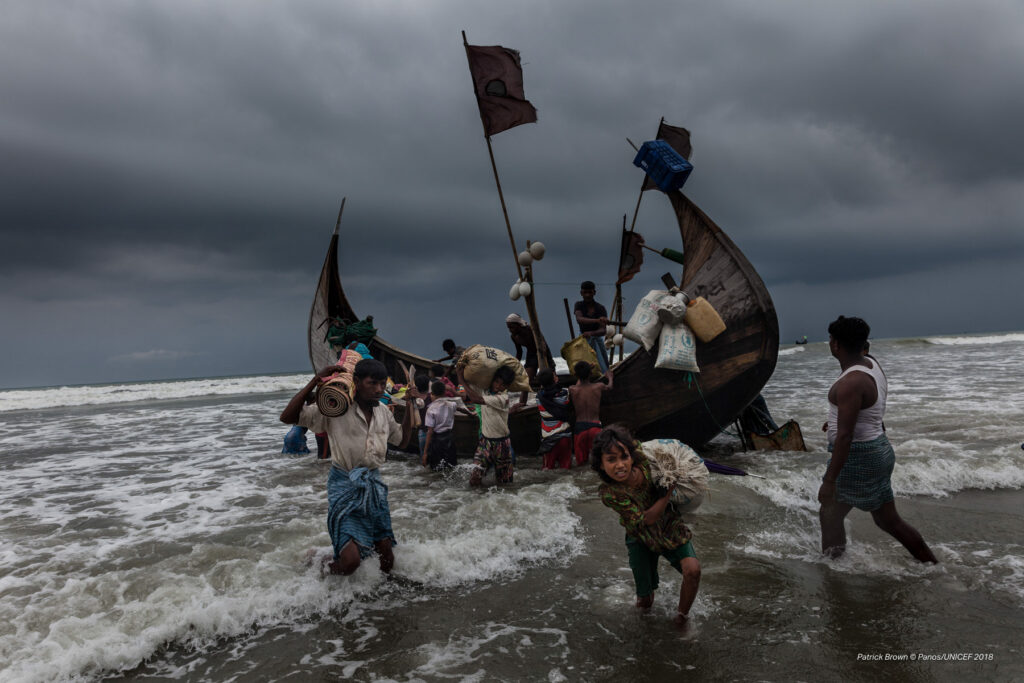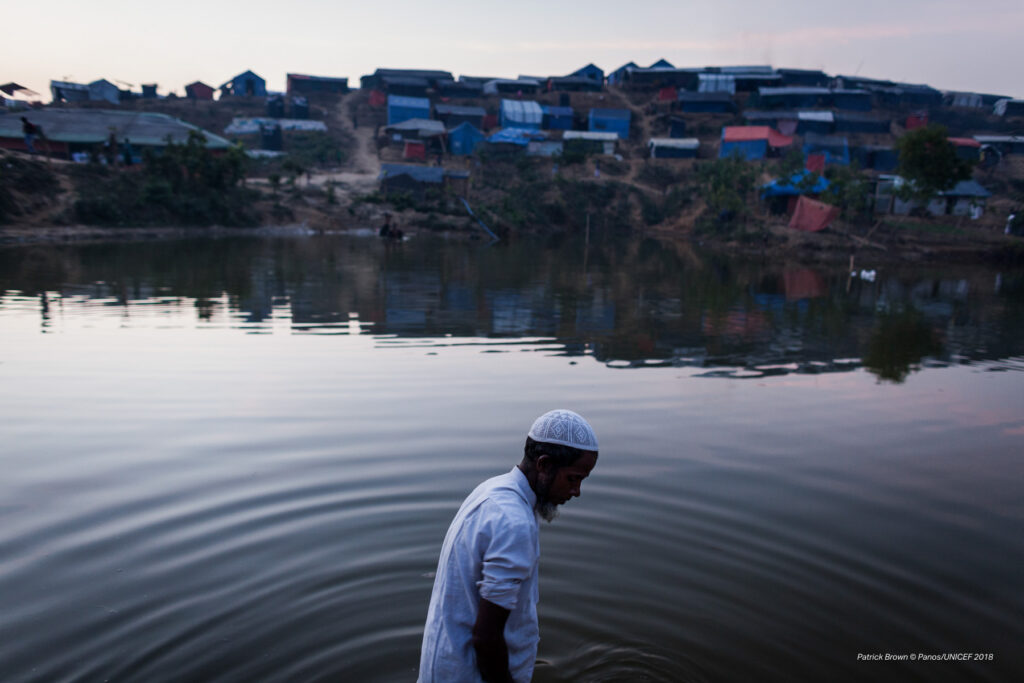Hello and welcome to MOAS…
Human Rights. They allow us find work, live safely, move freely and importantly, to be treated equally. But who defends them when they’re threatened? In this podcast we’re speaking to people working to defend the human rights of refugees and migrants, identifying violations and protecting those uncovering abuses.
Migrants and refugees are entitled to rights and protections while on the move. But as Christian Friis Bach, Secretary General for the Danish Refugee Council says, human rights and state obligations to those rights are under pressure. At the height of the EU – Turkey deal in 2015, the EU created temporary places known as ‘hotspots’. These were places where migrants would stay until their asylum applications were processed.
One of those locations was the Moria camp in Lesvos Greece. Two years on from its opening, reports from the camp listed a series of human rights violations committed against its residents. For a space built for 1,800 people, the camp was housing almost four times that many. Christian Friis Bach explains more about DRC’s findings…
That study was based primarily on our presence in the camps, the Moria camp with the protection team who is there on a daily basis. We were there witnessing the protection violations seen in the camp and also witnessing the conditions under which migrants and refugees are living and how they are treated and the access of basic dignity and the access of basic respect also for their rights within the camp.
So, this report is part based on our cooperation and our presence in the camp. Various officials from the Danish Refugee Council regularly visited the camp, joining our team in observing the conditions.
What does the Moria asylum centre tell us about the EU’s hotspot approach and if it upholds human rights?
I do not believe that the conditions in the Moria camp live up to the basic rights. I believe both refugees and asylum seekers experienced a broad range of violations when they arrived to the hotspots in Greece, including the lack of legal assistance and identification of vulnerable persons, restricted freedom, the lack of protection for vulnerable women and girls constitute human rights violations.
These are severe issues and we have for a long time called on European countries, the European commissions and the hosting countries of the hotspots to strengthen and improve the conditions in the camps and the protection of those staying there. This is what the report also tried to address; a call for action to ensure that we do not see further human rights violations on European soil towards refugees and migrants arriving in the hotspots.
I have been there myself to Moria and there are severe protection gaps and the people in the camp are not properly protected not least the women and girls. I believe the latest numbers from UNHCR show that one in four of all sexual violations of women and girls are actually happening within the camp, which of course is unacceptable. Police are not providing proper protection, the housing conditions are not adequate, safe or secure. You see a number of severe violations happening on European soil without proper action being taken. It’s not acceptable, it’s not dignified and it’s not living up to basic human rights.
Defending human rights isn’t simply reserved for large organizations like the United Nations. Human Rights Defenders are also individuals and sometimes even victims of violations themselves.
To get the message out about abuses, they risk their lives and often face the consequences. The NGO Front Line Defenders believes they need protecting too. Erin Kilbride is the media and visibility coordinator for the Irish NGO, which started in 2001. It supports HRDs at risk through a range of support from profile raising, to protection grants and respite.
So human rights defenders work non-violently to protect the rights of their communities. The human rights defenders that we support are working on a really wide variety of human rights issues and violations. This can range from people who are protecting the rights of the LGBTI communities and various different contexts, people working on land or indigenous people’s rights, on good governance, on election monitoring, on freedom from torture, a really wide variety of things. We work with defenders who work on all of these issues, again, our focus is on security and protection, not on one human rights area.
It’s important to say that HRDs are certainly not just people who work formally in NGOs or civil society organisations, not by a long shot. Definitely, those are HRDs. But, when we talk about HRDs, we’re talking about indigenous community leaders, farmers, teachers, journalists, bloggers, mothers; a wide range of people who are organizing their communities to protect their rights. That is something that is laid out in the declaration but it’s also really important to us as an organization, that we’re working for people and it’s about the work that they do. It’s not about a title or if they have a business card which says they are a human rights lawyer.
What kinds of challenges do you face trying to protect HRDs?
So first would be that we’re an organization that is focused on security and protection. So, in all the things that we do, we never want our work to put someone more at risk. That being said, defenders do, have an element of choosing risk. Deciding to go on TV in Bangladesh right now and to denounce the government’s very aggressive crackdown on student protestors. Deciding to be the face of criticizing the government’s lethal response to these protests, that’s dangerous and human rights defenders have chosen to do this anyway. There’s a bit of a balance there between, ‘we don’t want to put people more at risk but insofar as they have chosen to do that work despite of that risk we will support them on that’.
So, in addition to restricted legislation, we are very cognizant of things like demonization of human rights defenders. Again, you get that either ‘official foreign agent’ label or ‘agent of the west’ or ‘western backed’, it’s very common around the world. Communication with defenders can be very tricky. I think you’ve been doing a few podcasts lately on the Rohingya and if you think of Rakhine State where for decades the government has worked to ensure that limited information can get in or out, what does that mean for us as an organization that wants to support human rights defenders on the ground?
It’s all well and good for journalists from the UK are trying to get into Rakhine, but the international community needs the expertise of defenders who been there for decades documenting that information, but if we can’t communicate with them, how do we find out what they need? This is also true for other HRDs in other remote areas. So even if the military is not explicitly blocking off a community, you also have defenders from remote areas or rural and indigenous communities, don’t have access to certain types of communications. The Emergency protection grant therefore enables defenders to fill out a form on our website that is sent to us encrypted. However, if they don’t have access to the internet or a smartphone, encrypted communication is all well and good but how are we going to communicate with these HRDs that don’t have access to a phone.
Smear campaigns, just to go back to the defamation issue are a huge one and they can come from a corporation, a government, state aligned media and these are for HRDs where the risks are not always so tangible, the kind focused on reputation, community ties and strain on families. We are continuously working on how to reach the most at-risk defenders and to ones that don’t have access to mainstream networks or types of communication.
For example, if you’re working in a country where LGBT groups, and this is true in most countries in the world, where LGBT organisations have been historically marginalized from more mainstream civil society networks, then we have to be more intentional about doing outreach with these groups because if we only go through the mainstream networks in the capital, if historically LGBT work has been kept out of those spaces, then we won’t be reaching those defenders and even if we do, we be able to understand their unique needs.
If the evidence suggests genocide or crimes against humanity, should you wait for someone else to make the call? Fortify Rights is an independent rights organization that supports local human rights defenders while also investigating violations and influencing political players to act.
In the context of the recent Rohingya crisis, their painstaking research has helped them show the world how the Myanmar military prepared and executed its crackdown on the Rohingya. Matt Smith is the CEO and co-founder and he tells us more…
Noor Haba, 11, carries her family’s belongings to Shamlapur Beach in Bangladesh after the boat she traveled on from Maungdaw Township, Myanmar arrived safely at 8:43 a.m.First and foremost, collecting information is key. In our documentation of human rights violations, we aim to get as close as possible to the violations that are occurring; so we are speaking with survivors, eye-witnesses, government officials, in some cases perpetrators of human rights violations. We are collecting first hand testimony from those people. First-hand information is critical so when a human rights violation happens, very often there are many people within the community who know and in their mind they have knowledge of it but the key is to locate eye witnesses and survivors who have first-hand knowledge. We go about that process, we carefully document the testimony that they provide.
But I just want to emphasise that our documentation philosophy does not regard eyewitnesses and survivors as sources of information rather they are participants in the truth telling process so the way that we document testimony is really intended to empower the members of the community that we’re working with, they’re in charge in many ways and it’s an entirely voluntary process. But in terms of establishing the facts and in terms of understanding what exactly has taken place, it’s really important for us as a human rights organisation to always corroborate and triangulate information. If there are say 7 people from a village of 5,000 whom we all spoke to who all witnessed the same incident from different vantage points and they all describe similar or the same details, in a situation like that we grow more confident, we would regard that as corroboration.
Triangulating data, that means ensuring we have at least three sources on any one claim. This is really important. We never want to put any information out into the world that we’re not 100% confident is accurate. The truth is essential to human rights documentation. But in terms of producing the reports, this is all just the first stage. So once we collect the information, we store it in a qualitative data analyser so this helps us make sense of the data, it’s a way to organise the testimony and it helps us write it up in an easier way. We don’t just share the information that we collect, we analyse it within the framework of international law so what we’re trying to do really is, collect first-hand information, collect evidence also including photographs and video and then analyse it within the context of the law to determine what specific violations have occurred, what crimes have been committed and in the case of our most recent report, who specifically is or may be responsible for those crimes.
Once we have a draft of the report written, we tend to go through a very exhaustive vetting process. So typically, we’ll engage outside reviewers and these would typically be people outside of our organisation who would be in a position to critically review the work and we have a very thorough internal quality control process that we use, really to make sure that we’re not making any errors. Then after that, assuming we’ve all survived that very lengthy process, we hand it over to our design specialist Yuri, who takes it all and turns it into a compelling format that will help us effectively communicate the information to audiences.
A Rohingya refugee uses one of the many man-made dams in Balokhali 2 refugee camp, Cox’s Bazar District, Bangladesh.In terms of declaring a situation a human rights violation, a crime against humanity or a genocide, do you independently make those calls on your own evidence or do await a response from a higher international mechanism to declare it?
Well its interesting. It’s a great question. For some reason genocide is the lone crime that people tend to suggest some higher authority needs to declare it before we can all be comfortable with the term. We disagree with that notion. Making legal determinations with regards to human rights violations is not the exclusive domain of the international criminal court, it’s not the exclusive domain of international lawyers or human rights experts. Members of the Rohingya community in this particular case can and should analyse the situation and make their own judgments and make their own determinations about what is going on.
So, from our perspective as an independent human rights organisation, we collect our own information and we make our own independent legal determinations, so we analyse the facts within the framework of international human rights and international criminal law and we make determinations based on that. In doing so, we do on occasion work closely with other organisations and law firms. For example, on our most recent report, we worked closely with a team of lawyers from Covington and Burling which is a large international law firm and they provided their own legal analysis to the facts that we had established. That’s very helpful.
In 2015 we did a project with a team from Yale Law School led by Professor Jim Silk and that was a process in which the team from Yale took some of our information and analysed it within the context of the law. We don’t have to wait for a response from a higher international mechanism to determine if the crimes that are being perpetrated constitute genocide or crimes against humanity. Its all of our responsibility to take a look at what’s happening and try to make accurate determinations based on the facts.

So we’ve found that defending human rights isn’t a role solely for large rights organizations like UNHCR to do, even individuals are risking their lives to tell the world about abuses. And, it’s not simply about uncovering them, it’s also about getting that painstaking work to the right tables and agendas of change makers.
A body of evidence has been gathered since August last year and much of it is showing human rights abuses and atrocities tantamount to genocide against the Rohingya. The question is now, will they receive justice through the International Criminal Court?
If you liked this Podcast don’t forget to hit like, comment and subscribe for more Podcasts from us. You can also follow us on our social media. Check out our latest updates on Facebook, Twitter, Instagram, Youtube and AudioBoom… or you can donate to help us help Rohingya refugees. From all of us here at MOAS: goodbye.


